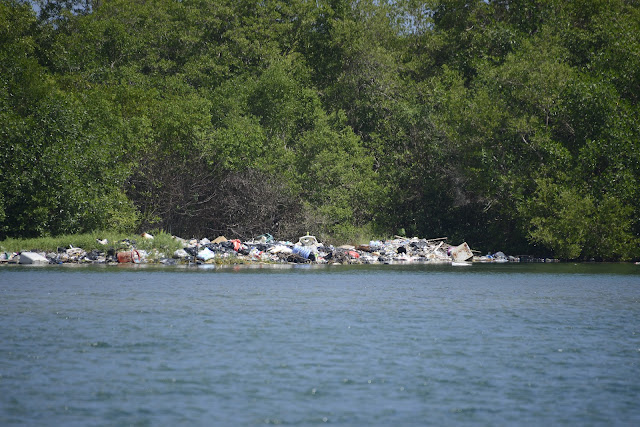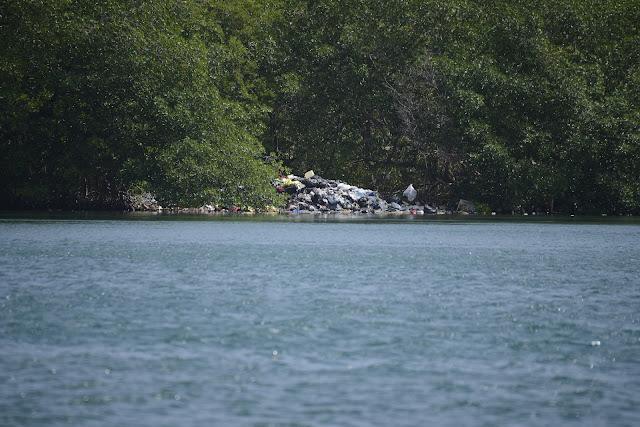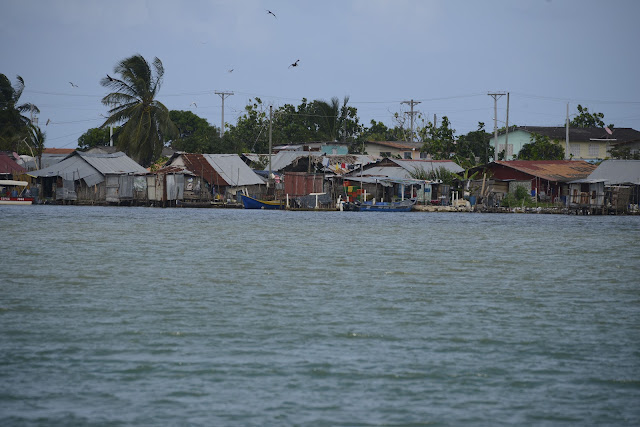- Get link
- X
- Other Apps
Hola! it calls from the side and a grinning Kuna looks up at me, wants to sell fish, fruit or Molas. Depending on the anchorage, this happens every quarter of an hour. We as yachtis are often the only source of income on the San Blas Islands and since the competition is great, one must not be squeamish. Everywhere "white people" appear, they are approached and one offers oneself as a tourist guide, or tries to sell something.
 |
| Typical wooden boat of the Kunas |
Otherwise, people here live off the state or go fishing. The state income goes at the end of the month to the village clerk, who distributes the money in the community. Fishing is done with a line. If one is very lucky and catches a few more fish, one stays at home the other day and deals with other things. You only fish as much as you or your family need. This has its advantage, it keeps the fish stock up. However, the stock is threatened from another side. Unfortunately, the Kunas don't seem to understand this. Or, due to a non-existent concept, the alternative is missing. With the entry of civilization into their simple life, also began the problem of garbage disposal and especially the disposal of plastic waste. Already in the Antilles arc we noticed that the Caribbean, generally has a problem with plastic. Again and again one finds contaminated beaches. The beaches are only the tip of the iceberg, what is in the water and decomposes to micro plastic, endangers the fish population and thus the Caribbean population. Even if little supported, in the Antilles arc, individual initiatives try to make their contribution and to collect and recycle the plastic waste. Even if there is still a lot of potential for expansion, this is at least a start. On the San Blas Islands, such concepts do not exist at all. The Kunas, recognized as autonomous by the Panamanian government, are completely left alone with the waste disposal problem. The consequence is, wild disposal in the adjacent mangrove forests, the inhabited Kuna settlements.
 |
| Garbage disposal on the San Blas |
Due to tides, currents, wind and weather conditions, the plastic waste has now spread to all islands, including the uninhabited. I do not exaggerate when I call this condition an ecological catastrophe. Under these circumstances, the call of our association Trans Ocean, to the "Catch of the day", in which we sailors are called to fish once a day, drifting plastic, from the sea and recycle it, seems almost grotesque. What happens here makes us incredibly sad.
 |
| Garbage dump in the mangroves |
Maybe the myth of San Blas will remain in people's minds for some time, but it will gradually fade away. The last thing to come will be the weekend tourists from Panama City, but there will be no more foreign tourists for a long time. The Kuna will be the very last to notice when there is no more fish to eat, but then it will be too late. I am writing this because I don't want to give up hope that maybe someone is reading this who has enough influence and knows the right people who could change this. Setting up a disposal concept, making it clear to the people that they are depriving themselves of their livelihood, would only be the beginning.
 |
| Nargana Yandup, Panama |
The region deserves it, the nature is so rich in species and beautiful here that it does not deserve such a destruction. For us the San Blas Islands were one of the planned highlights. Now, after good two weeks, they are at the bottom of our list. We will now continue on our way to the Panama Canal and hope that we will discover one or the other beautiful spot, on the outer reefs. Maybe the water is a bit clearer and there are not too many plastic bottles around.
 |
| San Blas Islands, Panama |
In the meantime, due to the persistent calm, we are running a bit low on diesel. We decide to make a stop in Corazon de Jesus to bunker some diesel. On the island there is no gas station as such, rather there are a few barrels next to a shed, from which the diesel is sucked by means of a hose and filled into canisters. Assumes, of course, that one is in possession of such a canister. Better yet you have several, then you don't have to go back and forth so often. In our case, I have two 6gal tanks filled with 22 liters each. This takes about half an hour. Another half hour I had waited before, on the man with the hose. So, all in all, an hour, which makes me think that an electric car, in fast charging, doesn't need much longer either. But it is finally soccer world cup and here in Panama one looks enthusiastically, every game. Since such things as diesel spend, must stand behind. Despite these obstacles, we now have enough diesel to get us at least to Linton Bay Marina.
 |
| Achutupu, San Blas Islands, Panama |
Hola! And again it calls from outside, and again a rowing boat, built from a hollowed tree trunk, lies next to us. This time there is lobster. Also not bad. Well then we will negotiate once. As always, we wish you fair winds and keep a stiff upper lip.
- Get link
- X
- Other Apps
Comments
Post a Comment